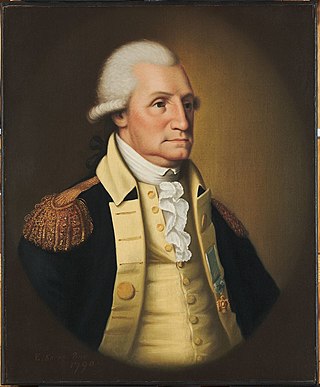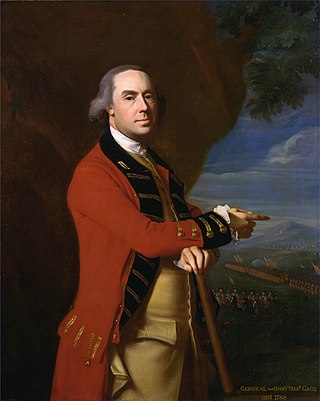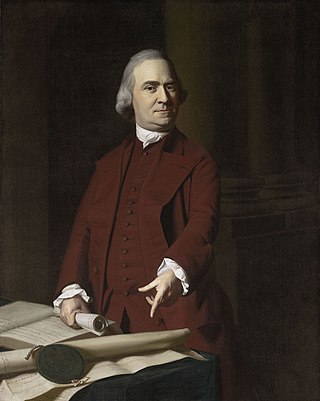
John Hancock was an American Founding Father, merchant, statesman, and prominent Patriot of the American Revolution. He served as president of the Second Continental Congress and was the first and third Governor of the Commonwealth of Massachusetts. He is remembered for his large and stylish signature on the United States Declaration of Independence, so much so that the term John Hancock or Hancock has become a nickname in the United States for one's signature. He also signed the Articles of Confederation, and used his influence to ensure that Massachusetts ratified the United States Constitution in 1788.

The Boston Massacre was a confrontation in Boston on March 5, 1770, in which a group of nine British soldiers killed five people of a crowd of three or four hundred who were harassing them verbally and throwing various projectiles. The event was heavily publicized as "a massacre" by leading Patriots such as Paul Revere and Samuel Adams. British troops had been stationed in the Province of Massachusetts Bay since 1768 in order to support crown-appointed officials and to enforce unpopular Parliamentary legislation.

1776 is a musical with music and lyrics by Sherman Edwards and a book by Peter Stone. The show is based on the events leading up to the signing of the Declaration of Independence, telling a story of the efforts of John Adams to persuade his colleagues to vote for American independence and to sign the document. The show premiered on Broadway in 1969 where it received acclaim and won three Tony Awards, including Best Musical. The original production starred William Daniels as Adams, Ken Howard as Thomas Jefferson and Howard Da Silva as Benjamin Franklin.

The Society of the Cincinnati is a fraternal, hereditary society founded in 1783 to commemorate the American Revolutionary War that saw the creation of the United States. Membership is largely restricted to descendants of military officers who served in the Continental Army.

General Thomas Gage was a British Army general officer and colonial official best known for his many years of service in North America, including his role as British commander-in-chief in the early days of the American Revolution.

The Founding Fathers of the United States, commonly referred to simply as the Founding Fathers, were a group of late-18th-century American revolutionary leaders who united the Thirteen Colonies, oversaw the War of Independence from Great Britain, established the United States, and crafted a framework of government for the new nation.

Joseph Warren, a Founding Father of the United States, was an American physician who was one of the most important figures in the Patriot movement in Boston during the early days of the American Revolution, eventually serving as President of the revolutionary Massachusetts Provincial Congress. Warren enlisted Paul Revere and William Dawes on April 18, 1775, to leave Boston and spread the alarm that the British garrison in Boston was setting out to raid the town of Concord and arrest rebel leaders John Hancock and Samuel Adams. Warren participated in the Battles of Lexington and Concord the following day, the opening engagements of the American Revolutionary War.

The Granary Burying Ground in Massachusetts is the city of Boston's third-oldest cemetery, founded in 1660 and located on Tremont Street. It is the final resting place for many notable Revolutionary War-era patriots, including Paul Revere, the five victims of the Boston Massacre, and three signers of the Declaration of Independence: Samuel Adams, John Hancock, and Robert Treat Paine. The cemetery has 2,345 grave-markers, but historians estimate that as many as 5,000 people are buried in it. The cemetery is adjacent to Park Street Church, behind the Boston Athenaeum and immediately across from Suffolk University Law School. It is a site on Boston's Freedom Trail.

Liberty's Kids is an American animated historical fiction television series produced by DIC Entertainment, and originally aired on PBS Kids from September 2, 2002, to April 4, 2003, with reruns airing on most PBS stations until October 8, 2004.

The Boston Gazette (1719–1798) was a newspaper published in Boston, in the British North American colonies. It was a weekly newspaper established by William Brooker, who was just appointed Postmaster of Boston, with its first issue released on December 21, 1719. The Boston Gazette is widely considered the most influential newspaper in early American history, especially in the years leading up to and into the American Revolution. In 1741 the Boston Gazette incorporated the New-England Weekly Journal, founded by Samuel Kneeland, and became the Boston-Gazette, or New-England Weekly Journal. Contributors included: Samuel Adams, Paul Revere, Phyllis Wheatley.

The Massachusetts Historical Society (MHS) is a major historical archive specializing in early American, Massachusetts, and New England history. The Massachusetts Historical Society was established in 1791 and is located at 1154 Boylston Street in Boston, Massachusetts, and is the oldest historical society in the United States.

1776 is a 1972 American historical musical drama film directed by Peter H. Hunt and written by Peter Stone, based on his book for the 1969 Broadway musical of the same name, with music and lyrics by Sherman Edwards. Set in Philadelphia in the summer of 1776, it is a fictionalized account of the events leading up to the signing of the Declaration of Independence. The film stars William Daniels, Howard da Silva, Donald Madden, John Cullum, Ken Howard and Blythe Danner.

John Adams is a 2008 American television miniseries chronicling most of U.S. President John Adams's political life and his role in the founding of the United States. The miniseries was directed by Tom Hooper and starred Paul Giamatti in the title role. Kirk Ellis wrote the screenplay based on the 2001 book John Adams by David McCullough. The biopic of Adams and the story of the first 50 years of the United States was broadcast in seven parts by HBO between March 16 and April 20, 2008. John Adams received widespread critical acclaim and many prestigious awards. The show won four Golden Globe awards and 13 Emmy awards, more than any other miniseries in history.

Samuel Adams was an American statesman, political philosopher, and a Founding Father of the United States. He was a politician in colonial Massachusetts, a leader of the movement that became the American Revolution, and one of the architects of the principles of American republicanism that shaped the political culture of the United States. He was a second cousin to his fellow Founding Father, President John Adams.
The Adams Chronicles is a thirteen-episode miniseries by PBS that aired in 1976 to commemorate the American Bicentennial.
The Society of Colonial Wars is a hereditary society composed of men who trace their descents from forebears who, in military, naval, or civil positions of high trust and responsibility, by acts or counsel, assisted in the establishment, defense, and preservation of the mainland American colonies of Great Britain.
The Boston Society for the Diffusion of Useful Knowledge in Boston, Massachusetts, was founded "to promote and direct popular education by lectures and other means." Modelled after the recently formed Society for the Diffusion of Useful Knowledge in London, the Boston group's officers included Daniel Webster, Nathan Hale, Jacob Bigelow, William Ellery Channing, Edward Everett, Nathaniel L. Frothingham, and Abbott Lawrence. The society published the American Library of Useful Knowledge, a series of scholarly works by British and American authors. Public lectures on a variety of topics were held at Boston's Masonic Temple, and other venues.

Sons of Liberty is an American television miniseries dramatizing the early American Revolution events in Boston, Massachusetts, the start of the Revolutionary War, and the negotiations of the Second Continental Congress which resulted in drafting and signing the 1776 United States Declaration of Independence in Philadelphia, Pennsylvania. The three-part miniseries premiered on History on January 25, 2015, directed by Kari Skogland. The theme music was composed by Hans Zimmer.

The Loyal Nine were nine American patriots from Boston who met in secret to plan protests against the Stamp Act of 1765. Mostly middle-class businessmen, the Loyal Nine enlisted Ebenezer Mackintosh to rally large crowds of commoners to their cause and provided the protesters with food, drink, and supplies. A precursor to the Sons of Liberty, the group is credited with establishing the Liberty Tree as a central gathering place for Boston patriots.
















